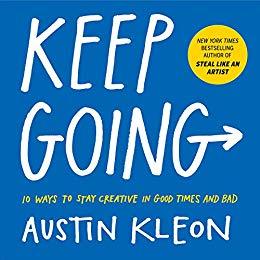More on this book
Community
Kindle Notes & Highlights
by
Austin Kleon
Read between
February 27 - February 28, 2023
When I’m stuck in the morning and I don’t know what to write about in my diary, I’ll modify the pros-and-cons list. I’ll draw a line down the middle of the page, and in one column I’ll list what I’m thankful for, and in the other column, I’ll write down what I need help with. It’s a paper prayer.
like to look back at the end of each year and see where I’ve been, so I’ll make a “Top 100” list of favorite trips, life events, books, records, movies, etc. I stole this practice from cartoonist John Porcellino, who publishes a “Top 40”–style list in his zine, King-Cat. (He, too, is a big list-maker; he’ll keep long lists of stories and drawing ideas for the zine before he actually sits down to draw them.) Each list is like an organized diary of the year.
When I need to keep myself spiritually on track, I’ll make a version of my own Ten Commandments. A list of “Thou shalts” and “Thou shalt nots.” Come to think of it, this book is one of them.
When the sun goes down and you look back on the day, go easy on yourself. A little self-forgiveness goes a long way. Before you go to bed, make a list of anything you did accomplish, and write down a list of what you want to get done tomorrow.
You must retreat from the world long enough to think, practice your art, and bring forth something worth sharing with others.
You must have a room, or a certain hour or so a day, where you don’t know what was in the newspapers that morning, you don’t know who your friends are, you don’t know what you owe anybody, you don’t know what anybody owes to you. This is a place where you can simply experience and bring forth what you are and what you might be. This is the place of creative incubation. At first you may find that nothing happens there. But if you have a sacred place and use it, something eventually will happen.
Note that Campbell says you must have a room or a certain hour. A bliss station can be not just a where, but also a when. Not just a sacred space, but also a sacred time.
What’s clear is that it’s healthiest if we make a daily appointment to disconnect from the world so that we can connect with ourselves. Kids, jobs, sleep, and a thousand other things will get in the way, but we have to find our own sacred space, our own sacred time.
When you reach for your phone or your laptop upon waking, you’re immediately inviting anxiety and chaos into your life.
Write a poem and don’t show it to anybody. Tear it up into little pieces and throw them into the trash can. “You will find that you have already been gloriously rewarded for your poem. You have experienced becoming, learned a lot more about what’s inside you, and you have made your soul grow.”
“Practicing an art, no matter how well or badly, is a way to make your soul grow, for heaven’s sake.”
Another trick: When nothing’s fun anymore, try to make the worst thing you can. The ugliest drawing. The crummiest poem. The most obnoxious song. Making intentionally bad art is a ton of fun.
Don’t get bogged down. Stay light. Play.
When you start making a living from your work, resist the urge to monetize every single bit of your creative practice. Be sure there’s at least a tiny part of you that’s off-limits to the marketplace. Some little piece that you keep for yourself.
To slow down and pay attention to your world, pick up a pencil and a piece of paper and start drawing what you see.
“The purpose of being a serious writer is to keep people from despair,” writes Sarah Manguso. “If people read your work and, as a result, choose life, then you are doing your job.”
And you don’t want to change your mind too much, heaven forbid, because then you’re wishy-washy.
To have hope, you must acknowledge that you don’t know everything and you don’t know what’s going to happen.
“We are excluded from no age, but we have access to them all,” he said. “Why not turn from this brief and transient spell of time and give ourselves wholeheartedly to the past, which is limitless and eternal and can be shared with better men than we?” (He wrote that almost two thousand years ago!)
“If papers everywhere on the floor makes working easier right now, because you need to constantly refer to them, then they should stay there.”


